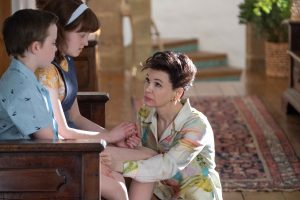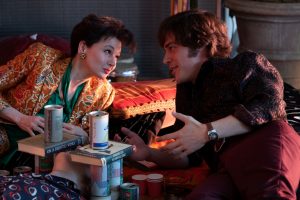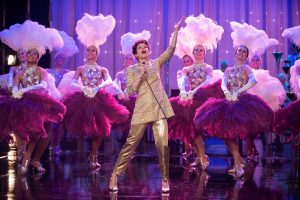“Judy” (2019). Cast: Renée Zellweger, Jessie Buckley, Finn Wittrock, Rufus Sewell, Michael Gambon, Darci Shaw, Bella Ramsey, Lewin Lloyd, Gemma-Leah Devereux, Royce Pierreson, Richard Cordery, Andy Nyman, Daniel Corqueira, John Dagleish, Adrian Lukis, Tom Durant Pritchard, Gus Barry, Jodie McNee, Ed Stoppard. Director: Rupert Goold. Screenplay: Tom Edge. Play: Peter Quilter, End of the Rainbow. Web site. Trailer.
Everybody loves someone trying to make a comeback, especially when it’s a beloved entertainer. Audiences appreciate the effort, particularly when the talent is genuine and heartfelt. But launching a personal renaissance can be challenging if it’s burdened by baggage from the past, a bittersweet saga detailed in the new, fact-based biopic, “Judy.”
In winter 1968, singer-actress Judy Garland (Renée Zellweger) had fallen on hard times. The inimitable entertainer, who had made a name for herself as an adolescent (Darci Shaw) as the legendary Dorothy Gale in “The Wizard of Oz” (1939) and as the sidekick of Mickey Rooney (Gus Barry) in several of the Andy Hardy movies (1938, 1940, 1941), was experiencing difficulties in both her professional and personal lives. She was having trouble getting auditions, finding a manager and earning a living. That, in turn, led to problems at home, making it hard for her as a single mother to support her two youngsters, Lorna (Bella Ramsey) and Joey (Lewin Lloyd), children from her marriage to businessman/producer Sid Luft (Rufus Sewell), her third husband from her four failed relationships. For someone who had once been a member of Hollywood’s elite and one of its most dynamic talents, this was all quite a comedown. Judy needed a break to get her life back on track, both at home and on stage and screen.
Professionally speaking, that opportunity came along with a chance to play an engagement at The Talk of the Town, one of London’s most prestigious nightclubs. Owner and impresario Bernard Delfont (Michael Gambon) offered Judy a huge contract, one that would significantly help her get back on her feet, especially where supporting her children was concerned. There was just one hitch – she would have to leave Lorna and Joey with Sid while she was gone, something she dreaded doing. Judy adored her kids and wanted so much to care for them, so the thought of having to “abandon” them to be able to support them pained her tremendously.
[caption id="attachment_11016" align="aligncenter" width="300"] On stage at London’s Talk of the Town nightclub, legendary singer-dancer Judy Garland (Renée Zellweger) attempts a comeback in her career in director Rupert Goold’s new biopic, “Judy.” Photo by David Hindley, courtesy of LD Entertainment and Roadside Attractions.[/caption]
On stage at London’s Talk of the Town nightclub, legendary singer-dancer Judy Garland (Renée Zellweger) attempts a comeback in her career in director Rupert Goold’s new biopic, “Judy.” Photo by David Hindley, courtesy of LD Entertainment and Roadside Attractions.[/caption]
That anguish was offset somewhat when she met a new would-be romantic interest, entrepreneur-promoter Mickey Deans (Finn Wittrock), while attending a party she was invited to by her eldest daughter, actress Liza Minelli (Gemma-Leah Devereux). Mickey helped to brighten her spirits in the time before departing for London, a development that helped to soften the blow.
Upon arrival in the U.K., Judy was welcomed with open arms by her hosts. She was put up in a posh suite at a luxurious hotel and assigned an assistant, Rosalyn Wilder (Jessie Buckley), to attend to her needs – and to keep Judy on track. That last task was important given the reputation Judy had developed for unreliability (part of the reason why she had trouble finding work, representation and income). Having become known for an unpredictable streak, an ongoing struggle with insomnia (and related substance abuse issues) and even a suicide attempt, Judy was something of a risk for anyone willing (some would say foolish) to hire her. But Delfont – and London – wanted her nevertheless, even if that took some serious babysitting.
Judy’s engagement got off to a rocky start. But, as the consummate professional that she was, she soon settled in and did what she was hired to do. That was helped along by the development of an unexpected friendship with a pair of ardent fans, gay couple Dan (Andy Nyman) and Stan (Daniel Corqueira), and a surprise visit from Mickey, who brought his much-needed companionship, the prospect of a lucrative business deal for Judy and a surprise wedding proposal. Things were beginning to look up.
[caption id="attachment_11017" align="aligncenter" width="300"] Loving mother Judy Garland (Renée Zellweger, right) adores her children, Lorna (Bella Ramsey, center) and Joey (Lewin Lloyd, left), in the new fact-based biopic, “Judy.” Photo by David Hindley, courtesy of LD Entertainment and Roadside Attractions.[/caption]
Loving mother Judy Garland (Renée Zellweger, right) adores her children, Lorna (Bella Ramsey, center) and Joey (Lewin Lloyd, left), in the new fact-based biopic, “Judy.” Photo by David Hindley, courtesy of LD Entertainment and Roadside Attractions.[/caption]
Unfortunately, the hope didn’t last, and Judy fell back into her old ways. She was exhausted and burned out, not to mention discouraged, especially when she received distressing news from her children. Try as she might to save face, she seemed overwhelmed by everything that had built up on her over the years. In many ways, these circumstances foreshadowed what was to come, a tragic demise to a life characterized by a seemingly unending string of ups and downs – and an often-frustrating, ever-elusive search for happiness.
Many look upon Judy as a tragic character, a contention that legitimately has some merit. However, as she is portrayed here, Judy has a heroic streak as well, one that, in other contexts, is unfortunately overshadowed by other traits. In many ways, this is a half-empty/half-full glass scenario, one in which our individual perspectives about her are governed by how we see her life overall. But, for Judy’s part, what’s more important to consider is how she saw herself, an outlook governed by her beliefs. And understanding our beliefs is crucial, for they form the basis of the reality we experience as a result of the conscious creation process, the philosophy that maintains we draw upon these metaphysical building blocks to manifest our existence. Even if Judy never heard of this philosophy, it’s apparent that her life was a valiant attempt at learning how to grapple with its principles and to make them work for her.
[caption id="attachment_11018" align="aligncenter" width="300"] After four failed marriages, actress Judy Garland (Renée Zellweger, left) meets new romantic interest Mickey Deans (Finn Wittrock, right) in “Judy.” Photo by David Hindley, courtesy of LD Entertainment and Roadside Attractions.[/caption]
After four failed marriages, actress Judy Garland (Renée Zellweger, left) meets new romantic interest Mickey Deans (Finn Wittrock, right) in “Judy.” Photo by David Hindley, courtesy of LD Entertainment and Roadside Attractions.[/caption]
So how was Judy a hero? Quite simply, she was a fighter, and she had much to combat during her all-too-brief 47 years. After a difficult upbringing, some would say she hit the jackpot when she was discovered by Hollywood. However, once there, Judy faced new challenges from the excessively controlling studio system that tried to dictate virtually every aspect of her personal life, largely because of the impact it was believed it would have on her professional life (and, hence, the studio’s bottom line). In a series of flashbacks, for instance, viewers witness the heavy-handed tactics of studio chief Louis B. Mayer (Richard Cordery), a condescending, demanding father figure who strong-armed Judy not only in career matters, but also in who she could date, how much she should weigh, and even what and when she could eat. And, if she didn’t comply with his wishes, he resorted to other means to get his way, such as plying Judy with diet pills to control her weight and sleeping pills to induce the rest that the diet pills prevented her from getting.
Judy had her share of difficulties in her personal life as well, particularly in her romantic relationships. Given the difficulties she experienced in her professional life, she sought refuge in the comfort of her marriages. Unfortunately, she experienced her share of challenges in that arena as well, especially from spouses who sought to take advantage of her, gestures that necessitated her to fight back once again.
Judy tired of these circumstances quickly, and her rebellious streak surfaced. She fought back. She sought to reclaim her personal power. But, the more she railed against these situations, the more others came down on her. These were the beginnings of her reputation for being “difficult,” even though her actions were primarily intended at looking out for herself (even if she sometimes went overboard in these matters).
[caption id="attachment_11019" align="aligncenter" width="300"] Personal assistant Rosalyn Wilder (Jessie Buckley) is assigned to help – and to keep an eye on – actress-singer Judy Garland during a comeback engagement at London’s Talk of the Town nightclub in the new biopic, “Judy.” Photo by David Hindley, courtesy of LD Entertainment and Roadside Attractions.[/caption]
Personal assistant Rosalyn Wilder (Jessie Buckley) is assigned to help – and to keep an eye on – actress-singer Judy Garland during a comeback engagement at London’s Talk of the Town nightclub in the new biopic, “Judy.” Photo by David Hindley, courtesy of LD Entertainment and Roadside Attractions.[/caption]
Learning how to balance these considerations – the ability to look out for herself without shooting herself in the foot – was thus one of Judy’s principal life lessons, both in her life overall, as well as in the time frame depicted in this film. Some would say she got a raw deal and that she had to fight her way back from it. On the other hand, others would argue that she was her own worst enemy in how she handled herself. But to say that it’s all one thing or another is patently unfair. Like most of us, Judy struggled to do the best she could to learn these lessons and to come up with the manifesting beliefs needed to make them work.
Some items she clearly got right, and that’s more than apparent in the film. Her burgeoning talent as an entertainer, for instance, is a direct outgrowth of her belief in herself to be able to put on a show that others would love. Her confidence was at times put to the test, but, when the spotlight was on her, she rose to the occasion. Even when she fell on hard times, she could still captivate audiences with her singing and dancing. She was arguably one of the best of her generation.
[caption id="attachment_11020" align="aligncenter" width="300"] Consummate professional Judy Garland (Renée Zellweger, center) puts on quite a show for audiences at London’s Talk of the Town nightclub in “Judy.” Photo by David Hindley, courtesy of LD Entertainment and Roadside Attractions.[/caption]
Consummate professional Judy Garland (Renée Zellweger, center) puts on quite a show for audiences at London’s Talk of the Town nightclub in “Judy.” Photo by David Hindley, courtesy of LD Entertainment and Roadside Attractions.[/caption]
Judy also knew how to spread compassion, care and loving tolerance to others. This is obvious, for example, in her love for her children. But it was also apparent in the kindness she showed to others, like Dan and Stan, outsiders who often suffered harsh ridicule from mainstream society. Having often been subjected to the cruelty of others, Judy knew what it was like for those who suffered the same kind of treatment from callous, uncaring segments of society. She offered comfort and reassurance that there was nothing wrong with being oneself, no matter how different one might be, a belief she came to realize for herself and that she freely shared with others.
It’s indeed sad that Judy’s circumstances may have ended up being more than she could bear. But, in combatting those conditions, we should never forget that she fought the good fight, and “Judy” celebrates her courageous battle. Her spirit and gumption are indeed inspiring, qualities guaranteed to move viewers, especially in the film’s concluding sequence. It’s through those images that we should remember what gifts she gave us, having made the world a better place for her presence in it, one adorned by happy thoughts and resplendent rainbows.
[caption id="attachment_11021" align="aligncenter" width="300"] Crooning her signature melody “Over the Rainbow,” singer Judy Garland (Renée Zellweger, center) brings down the house in a touching moment in the moving new biopic, “Judy.” Photo by David Hindley, courtesy of LD Entertainment and Roadside Attractions.[/caption]
Crooning her signature melody “Over the Rainbow,” singer Judy Garland (Renée Zellweger, center) brings down the house in a touching moment in the moving new biopic, “Judy.” Photo by David Hindley, courtesy of LD Entertainment and Roadside Attractions.[/caption]
Doing justice to an iconic performer can be a tricky proposition, but “Judy” does just that where the legendary singer-dancer-actress is concerned. Renée Zellweger in a comeback performance of her own absolutely knocks it out of the park in a touching, brings-tears-to-your-eyes portrayal of the talented but tragic performer. While some elements might have been handled a little better (such as the pacing in the first 30 minutes), the film more than makes up for any minor shortcomings with Zellweger’s phenomenal singing and acting, capturing Judy’s sensitive but sad essence with heartfelt emotion and a superb rendition of her subject’s character. This may not be a perfect movie, but it’s one that absolutely gets it right where it counts.
The fondness we hold for certain entertainers never seems to fade. That’s especially true when they leave us too soon. There’s a certain unfairness associated with that, one that we have difficulty accepting. But, thankfully, we always have the artistry they leave behind. Judy Garland was one of those iconic performers, and her works have lived on long after she left us. And, through this film, she lives again, allowing us to relive the hope of a place where the dreams that you dare to dream really do come true.
Copyright © 2019, by Brent Marchant. All rights reserved.
Monday, October 7, 2019
‘Judy’ profiles a fighter in search of a comeback
Subscribe to:
Post Comments (Atom)

No comments:
Post a Comment